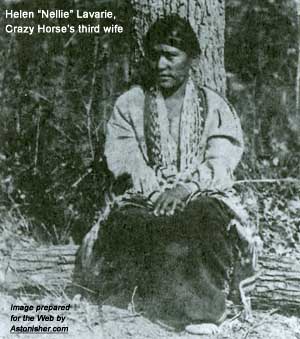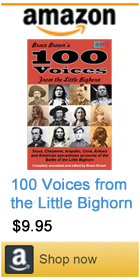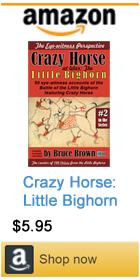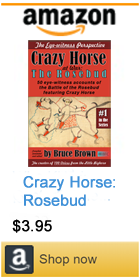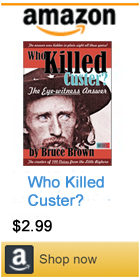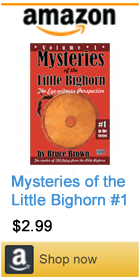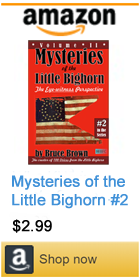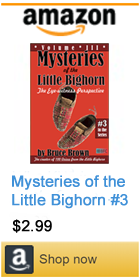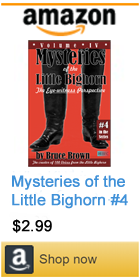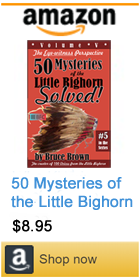|
||||||||||||
Bruce Brown's 100 Voices... Baptiste 'Big Bat' Pourier Recalls
Bat Pourier says: He was in Lt. Clark's quarters at the northwest corner of the square when Crazy Horse was wounded, and did not see the tragedy. He says that he himself and Touch the Cloud, Dr. McGillicudy, one soldier on guard, and the father of Crazy Horse (whose name was also Crazy Horse) were with him that night of his death until he died. Bat was the first to discover that Crazy Horse was dead. He remarked to the doctor that he was dead. The doctor said he guessed not, but on feeling of him found it was so. Then they feared to announce it to Crazy Horse Sr. on account of his grief. So Bat suggested giving him a drink of grog which was done, Bat getting his portion also. The old man expressed his satisfaction, saying it was good. Calling Bat his son, which he usually did, he said, "It was good, that will open my heart." Bat says: "Don't take it hard; your son is dead." The old man's outburst of grief and remorse was explosive. His expression: "Hengh" (a grunt like a bear when he seizes and squeezes, and is just an exclamation.) "Micinci watoye sni to lo." ("My son is dead without revenging himself!") Crazy Horse died at 4 o'clock a.m.1 Bat says: Crazy Horse was wounded this way (although he did not see it:) When Crazy Horse entered the guardhouse, Touch the Cloud was the first to speak and warn him that he was going into confinement-that he was in the guardhouse, as he saw and heard balls and chains. Crazy Horse sprang back and drew his knife; Little Big Man seized him, but Crazy Horse cut him across the base of the thumb and base of the forefinger -- a slight wound only-but Little Big Man howled and cried and acted the baby as though he was half killed. Bat says that when Crazy Horse was wounded there were orders to take him to Laramie in an ambulance, and from there to Omaha. Bat was to go with him, also Yankton Charlie and No Neck, and another, and an escort of [an] officer and soldiers.2 Bat's understanding is that Crazy Horse was purposely stabbed.
Bat says it was bad policy to arm Crazy Horse and some of his men as scouts. When Lt. Clark wanted him to go against the Nez Perces, Crazy Horse taunted him by saying that he [Crazy Horse] had given up his arms as an act of peace, and "now," he says, "you put arms into my hands again to go to war!" Bat does not know anything about the councils between Gen. Crook and the Indian scouts over the Agency question.4 Bat says that Garnett is in error about his being in the room with him at Lt. Clark's headquarters on the night of Crazy Horse's death, and being awakened in the morning by Crazy Horse Sr. Bat sat up that night with Crazy Horse. Richard G. Hardorff's Notes: 1 Pourier is mistaken. Crazy Horse died at 11:40 P.M., Wednesday, September 5, 1877. See Lt. William Clark's telegram to Gen. Crook, September 6, 1877; Col. Luther P. Bradley's telegram to Gen. Sheridan, September 6; Gen. Alfred H. Terry's telegram to Col. Miles, September 7; and Lt. Clark's letter to the Commissioner of Indian Affairs, September 10, 1877, Official Correspondence. The monument on Crazy Horse Mountain in South Dakota erroneously lists the date of death as September 6. 2 The third Indian Scout was Little Big Man. No Neck was a respected Oglala band leader. After enlisting as a U.S. Indian Scout he resided on No Neck Creek, Pine Ridge, where he died in 1887. The escort consisted of Company E, Third Cavalry, commanded by Second Lieutenant Henry R. Lemley. Lemley had received orders from Gen. Bradley to escort Crazy Horse to Fort Laramie by ambulance and from there to Cheyenne, where a train was to be boarded for Fort Marion, St. Augustine, Florida, where Crazy Horse was to be imprisoned. See H. R. Lemley to John G. Neihardt, March 5, 1920, Neihardt Collection, University of Missouri; Captain H. R. Lemley, "The Passing of Crazy Horse," Journal of the Military Service Institution of the United State (May-June, 1914) : 321. 3 For a discussion of this matter, see Eleanor Hinman to Mari Sandoz, December 7, 1947, and the latter's reply, December 10, 1947, both in the Hinman Collection, University of Nebraska, and the Tom Laravie Interview, undated, in William J. Bordeaux, Custer's Conqueror (Sioux Falls, no date), no pagination. 4 One of these councils took place at Camp Robinson on May 25, 1877, during which session, in a very rare display of public speaking, Crazy Horse briefly addressed Gen.Crook on the issue of a Northern Oglala agency. See the Chicago Times, May 26,1877. The Death of Crazy Horse: A Tragic Episode in Lakota History edited by Richard G. Hardorff, Bison Books, Lincoln, NE, and London 2001 p 91 - 94
Richard G. Hardorff wrote of Baptiste "Big Bat" Pourier: "The son of Joseph Pourier and Marie Aubuchon L'Arbe, Baptiste Pourier was born in St. Charles, Missouri, on July 16, 1842. At age fourteen he found employment as a teamster and moved with Indian traders into the country west of the Mississippi. In this capacity he gained a thorough knowledge of the country and the Sioux Indians, eventually marrying Josephine Richard, an Oglala mixed-blood of French extraction. Pourier's expertise was fully recognized by the military authorities in 1869 who employed him as a scout, guide, and interpreter for many years. Baptiste Pourier passed away on his Wounded Knee ranch near Manderson, South Dakota in 1932..." Regarding the title of Hardorff's book, The Death of Crazy Horse, and the more recent The Killing of Crazy Horse by Thomas Powers, I can't help wondering how many centuries will pass before Americans can speak the truth about what they did to Crazy Horse. Here's the plain fact of the matter. Crazy Horse was murdered, as Big Bat notes above, murdered by the American Army while being held in what we would now call, "protective custody." Has there ever been a people who liked the taste of their own lies as much as the Americans do? -- B.B.
|
||||||||||||



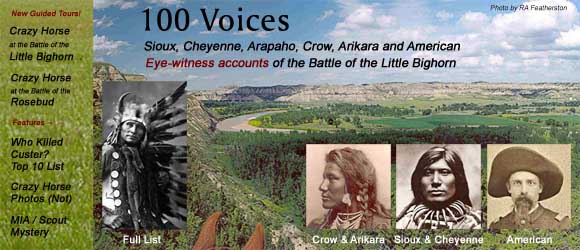
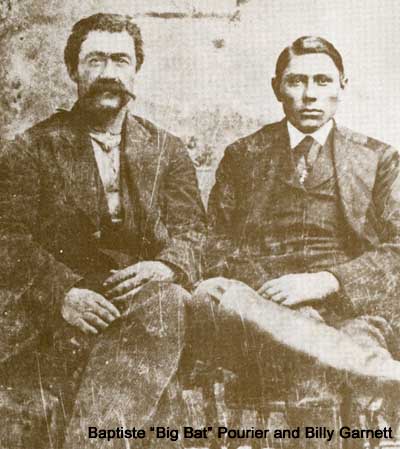 THE BAPTISTE POURIER INTERVIEW:
THE BAPTISTE POURIER INTERVIEW: